

The influence of the wind in the Schmallenberg virus outbreak in Europe : Scientific Reports. Dairy production boost for Ireland. Coveney: Europe must become a net exporter of food The majority of the increased product will be exported to emerging markets.
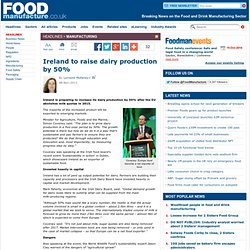
Minister for Agriculture, Foods and the Marine, Simon Coveney said: “The plan is to grow dairy production in a five-year period by 50%. The growth potential is there but how do we do it in a way that’s sustainable and pay farmers to ensure they are protected? We do that through education and innovation and, most importantly, by measuring progress step by step.” Coveney was speaking at the Irish food board’s recent event ‘Sustainability in action’ in Dublin, which showcased Ireland as an exporter of sustainable food. Invested heavily in capital Ireland has a lot of pent up output potential for dairy. Mark Faherty, economist at the Irish Dairy Board, said: “Global demand growth for dairy looks likely to outstrip what can be supplied from the main milk–producing regions.
Forests could face threat from biomass power 'gold rush' Britain's new generation of biomass power stations will have to source millions of tonnes of wood from thousands of miles away if they are to operate near to their full capacity, raising questions about the claims made for the sustainability of the new technology.

Ministers believe biomass technology could provide as much as 11% of the UK's energy by 2020, something that would help it meet its carbon commitments. The Environment Agency estimates that biomass-fired electricity generation, most of which involves burning wood pellets, can cut greenhouse gas emissions by up to 90% compared with coal-fired power stations. Eight biomass power stations, including one in a unit in the giant Drax power station, are operating in the UK and a further seven are in the pipeline. None operates near capacity. But now environmental groups are questioning where the new plants will source their wood if the technology takes off.
A Miracle New Plastic, Made From Anything But Nasty Stuff. Plastic was once a miracle invention, but these days the wonder is wearing thin.

Mounting pollution, the fact that plastic has an association with toxic substances, and its fossil fuel roots are just some of the reasons people are keen to find alternatives. Grower uses new kit to stop water run-off - 19/10. One retired Yorkshire grower-cum-inventor has come up with an innovative solution to reduce tramline run-off and protect two precious natural resources.
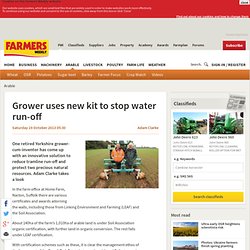
Adam Clarke takes a look In the farm office at Home Farm, Nacton, Suffolk there are various certificates and awards adorning the walls, including those from Linking Environment and Farming (LEAF) and the Soil Association. About 140ha of the farm’s 1,010ha of arable land is under Soil Association organic certification, with further land in organic conversion. For drought-plagued farmers: a gel that can suck up 250 times its weight in water. The long history of threats of drought in California make the big agricultural state a solid testing ground for tech that helps farmers reduce water use without sacrificing production.
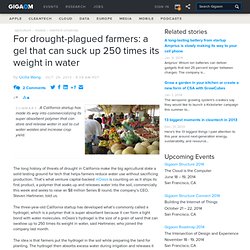
That’s what venture capital-backed mOasis is counting on as it ships its first product, a polymer that soaks up and releases water into the soil, commercially this week and seeks to raise an $8 million Series B round, the company’s CEO, Steven Hartmeier, told us. The three-year-old California startup has developed what’s commonly called a hydrogel, which is a polymer that is super absorbent because it can form a tight bond with water molecules. mOasis’s hydrogel is the size of a grain of sand that can swallow up to 250 times its weight in water, said Hartmeier, who joined the company last month. The idea is that farmers put the hydrogel in the soil while preparing the land for planting.
Yields of new varieties of agricultural crops continue to increase. More and more articles published in international reviews imply that crop production is barely increasing in countries where it is already high.
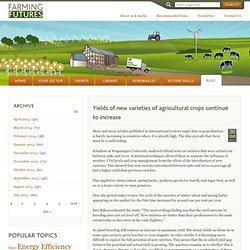
The idea prevails that there must be a yield ceiling. Scientists at Wageningen University analysed official tests on varieties that were carried out between 1980 and 2010. A statistical technique allowed them to separate the influence of weather, CO2 levels and crop management from the effect of the introduction of new varieties. This showed that new varieties introduced between 1980 and 2010 on average all had a higher yield than previous varieties. Fungus 'more efficient' than pesticides.
A genus of fungi has been found to have better control of soil pathogens than conventional pesticides, and can also help breed vegetable seedlings, research in China has shown.
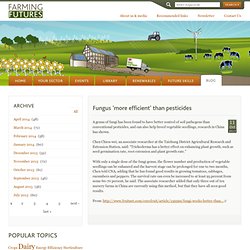
Chen Chien-wei, an associate researcher at the Taichung District Agricultural Research and Extension Station, said: “Trichoderma has a better effect on enhancing plant growth, such as seed germination rate, root extension and plant growth rate. " How turning manure into plastic could economize one type of energy production. Dairy is a big industry in Idaho.
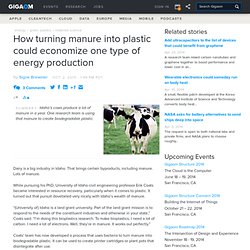
That brings certain byproducts, including manure. Lots of manure. While pursuing his PhD, University of Idaho civil engineering professor Erik Coats became interested in resource recovery, particularly when it comes to plastic.